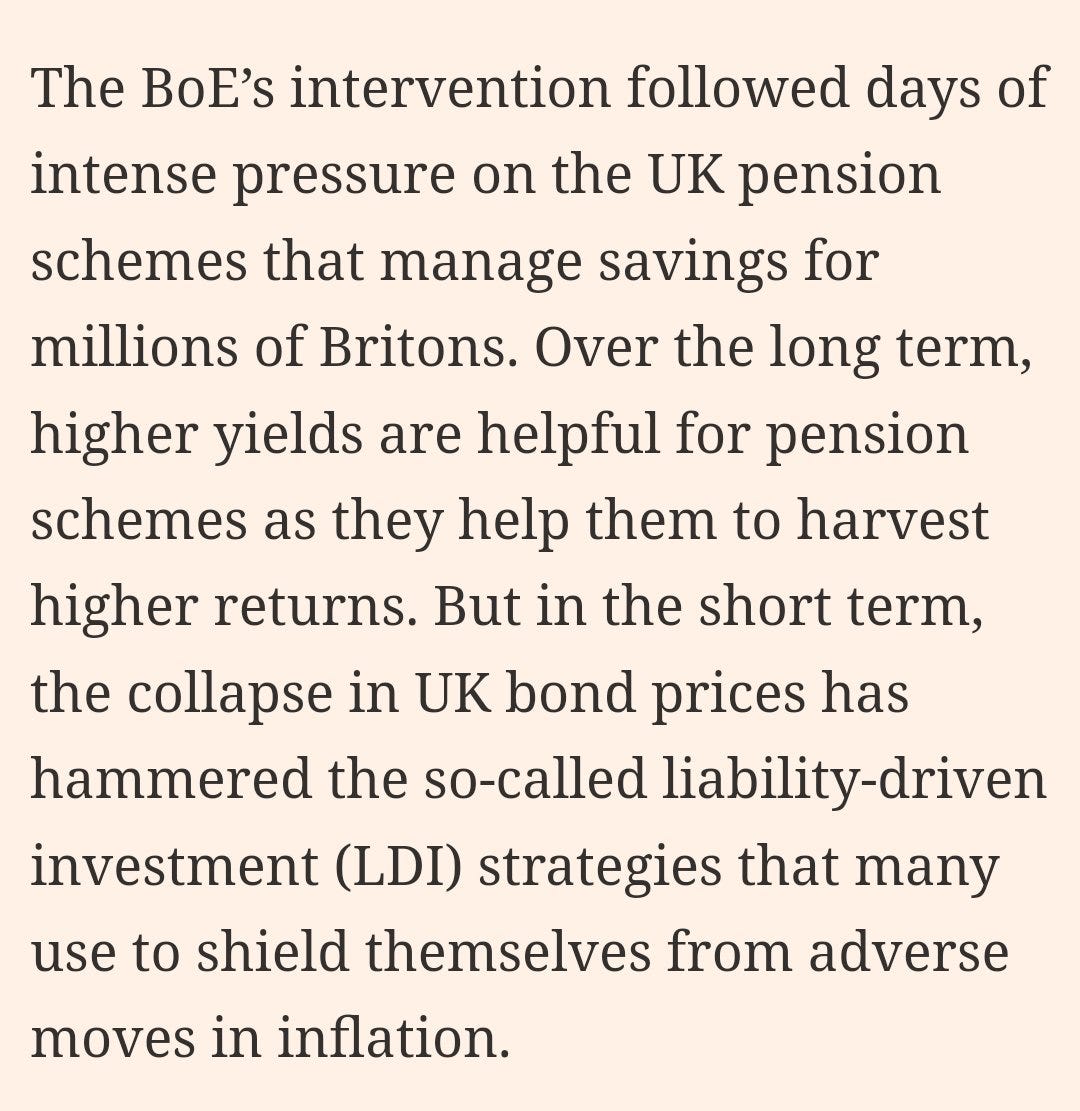UK Near Collapse, Who's Next.
The situation is more critical than people think.
On Wednesday, it was the Bank of England's (BoE) turn to speak, and it left one of the news of the week that we have been announcing for a long time.
According to what they have said, they are going to continue expanding their liquidity or Quantitative Easing (QE). Basically, they continue printing money for one reason: the country's pension funds have been on the verge of collapsing because they do not have the cash to meet their inflation hedges.
We are not aware of the seriousness of these facts. We are talking about a country that is forecast to have 18% inflation by 2023, and instead of stopping printing money and starting to raise interest rates, they have to do the opposite. The crash may be postponed, but obviously, it will be much worse.
Basically, this is like when you are at a party where there are 9 people left. 8 of them are already paired up and about to go home. You are drunk, very close to an overdose. Just at that moment, your best friend shows up with 6 bottles of beer, and you start drinking them with him. Well, the hangover will be infinitely worse.
In the case of the UK, it is not about beers. It is about 90% Alc. Absinthe.
What is happening is that pension funds are using hedges against interest rate risk in case inflation picks up. These strategies are very common in this type of product since what they want to guarantee is that a 30-year-old person who is starting to contribute to his pension plan does not receive his purchasing value divided by 10 on the day he retires but that the purchasing power, at least, is the same.
💥 Tip from the Asymmetric Finance team: if you have a pension plan, have it invested 100% in equities (ACWI), and when you go to withdraw it, schedule withdrawals (for example, $1.5k/month).
What has happened is that the beastly moves in the bond market these days were forcing these pension funds to be getting margin calls. Obviously, these pension funds do not have the money to meet these margin calls, causing the British's wealth to spiral down exponentially.
Selling during margin calls was occurring, which means more selling, and so the cycle continues.
We have said it before. If there is one thing that is clear to us in this life besides the fact that we are going to die, it is that the last dollar, euro, or pound that central banks grant will be in a pension. Therefore, if pension plans went bankrupt due to margin calls, the whole country would collapse financially.
But how can it be that both stocks and bonds are doing so badly? We have been warned we are facing one of the most complicated scenarios in history. The debt of countries exceeds 100% of GDP, and both bonds and stocks are falling by leaps and bounds.
⚠️ WARNING: we are not specialists in this product. The following statement may be wrong.
An LDI is not a future. Therefore, for what has happened, what has happened with margin calls, to have happened, it has had to be given that these contracts that ensure payment in the future imply having liquidity in the present (for all the people who want to redeem their pension). So the main problem of the models. Like all economic models throughout history. I didn't expect days of movements that don't happen for years.
As always, a black swan is doing his thing...
The models did not contemplate movements of the following style in the bond market...
Therefore, this should not be seen as the market doing: "print more money to prolong the welfare state" It should be interpreted as the BoE having had to save pension plans from the most absolute collapse in their history.
Precisely what a central bank should never do, is bail out a private entity, and which is only done at the most critical times (i.e., Fannie Mae).
What happened to the markets on Wednesday? Basically, the same thing that happened to you when your best friend showed up at the party with the bottle of absinthe. You went from being depressed to being upbeat. All the alcohol you have in your body does not let you see reality.
We have warned you for a long time that the pandemic brought a lot of monetary (and fiscal) stimulus. In addition, many production lines were paralyzed. This caused hyperinflation to occur when the lines were reopened, and with all the money in the markets, hyperinflation took place. This inflation caused stocks to rise in the short term and then fall, and the bond market collapsed.
As if that were not enough, the British came close to bankruptcy and started printing again.
Perhaps in the short term, there will be a resurgence of the situation, and perhaps other central banks will follow. What is clear to us is that the long term is very black.
The portfolios of 99.9% of the population are prepared for bull markets. None of them are prepared for the tremendous crash that is coming. We are, with our asymmetric portfolio. Sooner or later, it will happen, and don't say we didn't tell you.
What a time to be alive.
Now our portfolio is in detail.






